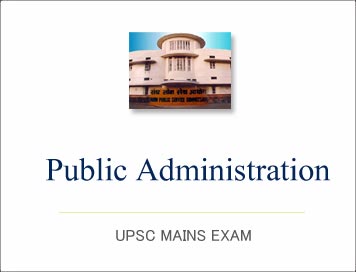(Download) UPSC IAS Mains 2012: Public Administration (Paper -2) Optional Question Paper
(Download) UPSC IAS Mains 2012: Public Administration (Paper -2) Optional Question Paper
Subject: Public Administration
Exam Date: 9th October 2012
Paper: II
File Size: 581 KB
File Type: PDF
Paper- II
:: Section ‘A’ ::
Q. 1. Attempt each of the following in about 150 words each: — 12 × 5 = 60
(a) “The Mughal Administrative System was military rule by nature and a form
of centralized despotism.” Analyse.
(b) ‘Judges should not govern the country. They can lay down a law, not
interfere with governance.’ Discuss.
(c) Critically examine the variables in the composition and functioning of
Cabinet Committees.
(d) “Memorandum of Understanding’ scheme between the Government and Public
enterprises has forced public undertakings to improve their overall
performance.” Do you agee with this statement?
(e) To what extent has the 74the Constitutional Amendment Act created a
‘federation within a federation’ in India?
Q. 2.
(a) “The success and prestige enjoyed by a Chief Secretary, to a large, upon
his equations with the varied sets of people and institutions that form the work
environment.” Critically evaluate the statement and its relevance to the role of
Chief Secretary in the discharge of his function. 30
(b) In the exercise of his/her functions, the President of India is a mere
‘Convenient working hypothesis’. Do you agree with this view? Justify your
reasoning with illustrations. 30
Q. 3.
(a) ‘Parliamentary Departmental Committees have played their role effectively
in analyzing the demands for grants.’ Evaluate. 20
(b) (i) Explain the emerging ambiguity in respect of the developmental role of
District Collector in the wake of the 73rd Constitutional Amendment Act. 10
(ii) Justify ‘indicative’ planning in the context of LPG. 10
(c) ‘Parliament is an independent institution, not to be seen as an extension of
government or of a party.’ Elaborate. 20
Q. 4.
(a) ‘The authority of the Governor in the discretionary field is not
unrestrained. If it is misused … the President can check him/her and if
necessary, he may even remover the Governor.’ Examine this statement critically
in the context of the Office of the Governor. 25
(b) Discuss the recommendations of the Sarkaria Commission in respect of the
National Development Council for improving Centre-State planning relations.
(c) ‘The Arthashastra is a book of political realism.’ Elaborate. 15
:: Section ‘B’ ::
5. Attempt each of the following in about 150 words each:— 12 × 5 = 60
(a) ‘Bureaucrats should not play politics, but understand how politics
works.’ Comment.
(b) ‘Good governance is closely aligned with effective democratic governance.’
Discuss
(c) ‘Corruption is more of an environmental than an administrative problem.’
Discuss.
(d) ‘Questions represent a powerful technique of parliamentary control over
expenditure.’ Explain.
(e) ‘Panchayati Raj Institutions are still affected by State control and
domination by bureaucracy.’ Do you agree?
Q. 6.
(a) Local self-government in India is the interplay of several factors —
historical, ideological, and administrative. Critically examine these factors.
30
(b) ‘Efforts made towards administrative reforms so far have been lacking in
congruence between strategy, structure and substance.’ Discuss with
illustrations. 30
Q. 7.
(a) Indian administration is yet to fully appreciate and adopt the benefits
of Information Technology. Elucidate. 15
(b) What is an output-based performance budgeting system? Analyse this system in
the context of India. 15
(c) NGOs demand greater autonomy from the State and are now ‘new actors’ in
development. How effective are they as instruments of decentralization and
debureaucratisation? Critically evaluate. 30
Q. 8.
(a) Compare and contrast the Padmanabhaiah, Riberio and Mallinath Committee
Reports. 25
(b) “Even though law and order administration is a State subject in the Indian
Constitution, it is paradoxical that the para-military and other kinds of
security forces under the Union Government have grown in recent years.”
Critically analyse the statement. 20
(c) How does New Localism impact Centre-State-Local relations in the era of LPG?
15


